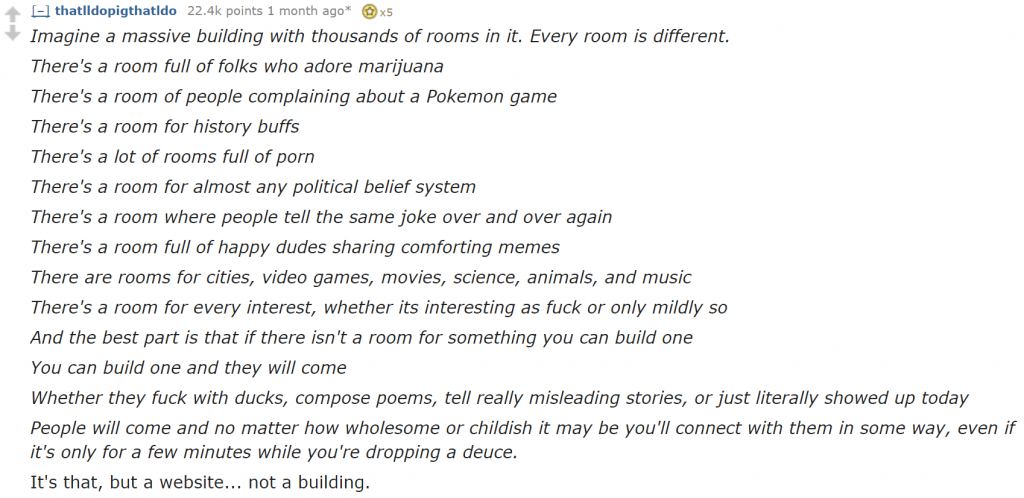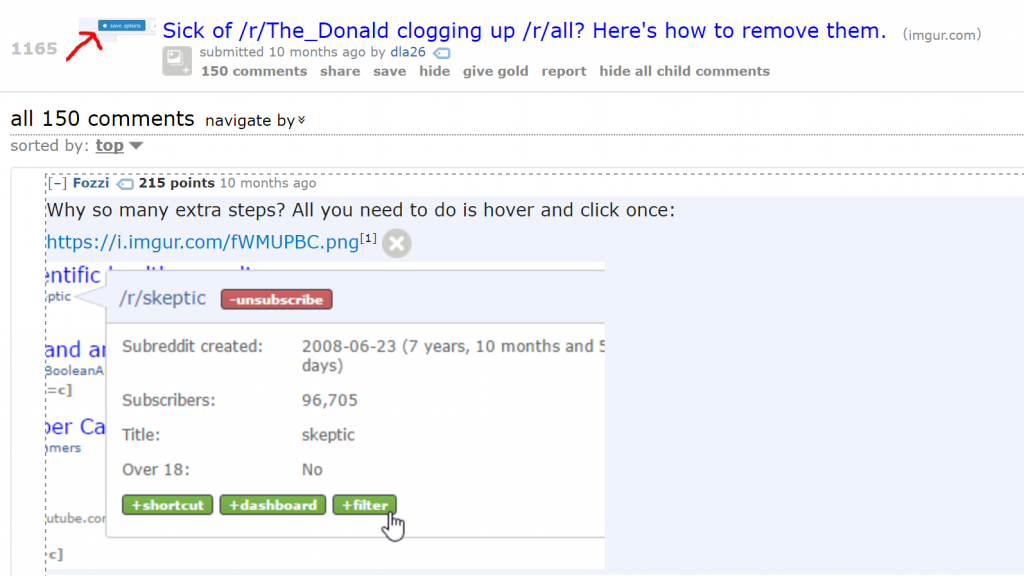“Front Page of the Internet”
In her recent blog post, Natasha highlighted the trends of news consumption by internet users. Increasingly, people are getting their news from the internet and social media sites, with Reddit and Facebook as the top two sites. Yet, Facebook has faced criticism of creating what Eli Pariser calls “filter bubbles”: “the lack of exposure to information that could challenge or broaden our worldview” (Pariser). Facebook creates these filter bubbles by selectively curating news that users prefer, and editing out content that does not fit their profile, inadvertently limiting what users may see. Many users of Reddit may consider Reddit as a more reliable news sources than Facebook as Reddit has a lax content policy and censorship is up to individual community moderators. On the surface, Reddit appears to be void of filter bubbles as few algorithms control what users see, with the community being responsible for what users see. However, I argue that in leaving this filtering to the community, Reddit does still create a filter bubble, but one that is determined by the popular or majority view, rather than computer algorithms. In doing so, a dominant view arises in Reddit, while fringe or unpopular opinions are silenced. In letting a user customise what they view, Reddit also creates its own echo chamber, where users knowingly surround themselves with similar views. In this aspect, it is an even more concerning phenomenon as people willingly choose to filter out dissent and debate.
a quick explanation of how reddit works by reddit user u/thatlldopigthatld
“Hivemind”
Reddit works more like a forum than a news site, focusing on crowd-sourced, user-generated content to create a community that shares content with one another rather than a team of reporters, writers, or editors. News content are often, however, links that a user shares on the site that direct users to an online news article. Since anyone can submit a link or news article, it is up to the community to decide what is seen and what is not on the overall site, through a voting system of “upvotes” and “downvotes”; as a thread’s popularity rises, so does its visibility on the front page.
Since a post or news article’s visibility is determined by the collective userbase, it is the majority that determines what each user sees on the front page of Reddit. As a result, the dominant perspective becomes the common view that Reddit offers to users, while minority and marginalised opinions receive less visibility. For those reasons, it becomes clear that while the site itself may not directly create a filter bubble through a personalisation algorithm, content is still filtered out and selectively curated by the collective user base through a voting algorithm. An overreliance on this view for one’s news content, sometimes referred to as the Reddit “hivemind”, is dangerous because it reflects what Reddit users think, rather than a balanced view of the world.
So what does this “hivemind” think of the world? According to Adrienne Massanari, it reflects a “geek culture” (331) that has a “fraught relationship to issues of gender and race” (332), as this culture “presume[s] a white male centrality” (332). While I would not go as far as Massanari’s subsequent evaluation that this breeds a toxic anti-feminist and misogynistic culture (336), it remains clear that if Reddit’s community is dominated by a specific population, then the voting system will only perpetuate those exact views. In a perfect democracy, the mob rules.
“Echo Chambers”
Perhaps one may still find a sense of community by subscribing to subreddits that share the same beliefs and interests as them. However, I argue that this act of opting in and selectively choosing voices that you wish to hear only serves to reinforce one’s own beliefs and values, as you surround yourself with like-minded individuals, which Reddit crudely yet somewhat aptly calls a “circlejerk” (yes, it’s exactly what it sounds like).
More concerning than this act of opting-in though, is the act of filtering out. The act of searching for a sense of belonging is not inherently bad, but the coupling with a refusal to hear other opinions only traps one within their echo chambers, where they do not hear any dissent or comprehensive views. In allowing one to personalise what they see, Reddit allows for an easy filtering out of content that users do not wish to see. One key example is the subreddit r/The_Donald created during Donald Trump’s run for president, which has been a commonly filtered out subreddit by many users. In a period of incredible political division, filtering out voices and arguments, whether legitimate or not, simply makes it easier to demonise and dehumanise the other party. In ignoring different opinions, we create our own filter bubbles and echo chambers.

reddit user u/Fozzi shows how easy it is to filter out a subreddit (and their voices!)
Conclusion
While Eli Pariser argues that the problem with filter bubbles occurs when you only see what you like to see, and don’t get to decide or see what is edited out, I argue that it is an equally pressing issue to knowingly edit your filter bubble. Sites that offer personalisation, whether automated or customised, inevitably shape our worldview. By making it convenient to edit something out, we are easily trapped within our own echo chambers, hearing only the voices and opinions that agree with us. As much as we try to convince ourselves that the internet has helped people around the world connect with one another, it has truly only reinforced our own worldview when we shield ourselves from criticisms and disagreements.
Works Cited
Massanari, Adrienne. “#Gamergate and The Fappening: How Reddit’s Algorithm, Governance, and Culture Support Toxic Technocultures.” New Media & Society 19.3 (2017): pp. 329-46. doi:10.1177/1461444815608807.
Pariser, Eli. “Beware Online ‘Filter Bubbles.’” Eli Pariser: Beware Online “Filter Bubbles” | TED Talk | TED.com, www.ted.com/talks/eli_pariser_beware_online_filter_bubbles?language=en#t-264389. Accessed 18 Mar. 2017.